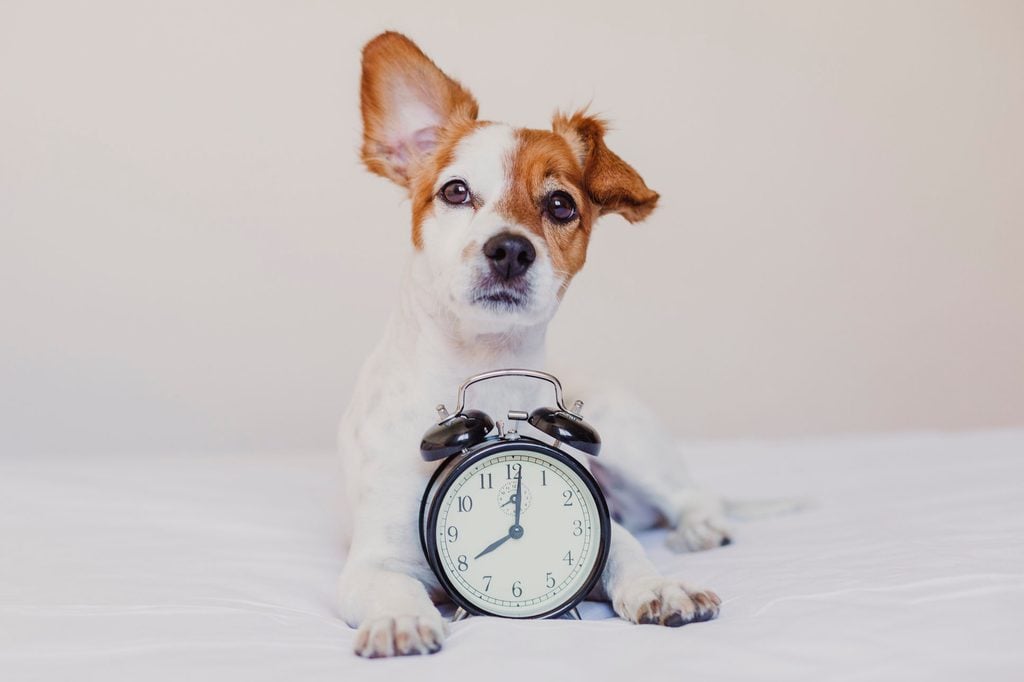Do Dogs Have a Sense of Time?
Updated: Nov. 04, 2022

If you've ever wondered how your pup always seems to know when it's time for dinner, you're in the right place.
As a dog owner, you might have noticed that your pup sits by her dinner bowl at 5 p.m. every night, or that she gets the zoomies in the minutes leading up to her 7 p.m. walk. Maybe Fido is even more reliable at waking you up in the morning than your trusty alarm clock (um, hello, it’s breakfast time!). If that’s the case, you might have wondered: Do dogs have a sense of time? Because it seems like your pup has figured out how to read the clock. To get to the bottom of this strange phenomenon, we asked an expert behaviorist how dogs perceive time and memories. Turns out, it’s a lot more complicated than you might think. If you want to know more about what’s going on with your pup, find out the reasons behind this other weird dog behavior.
Real talk: Can dogs tell time?
The answer is yes and no. “We don’t know for sure what dogs’ perception of time is, since we can’t really ask them,” says veterinarian Andrea Tu, DVM, Medical Director of Behavior Vets of New York. “But we do know that they are able to gauge time.”
However, just because dogs can gauge time doesn’t mean they perceive it the same way humans do—and they definitely don’t understand our concept of a ticking clock. But before we get into how your pup likely perceives time and memory, it’s important to lay out the two types of human memory: semantic and episodic. Dogs have one and (probably) not the other.
- Semantic memory: This type of memory includes the general knowledge we’ve accumulated throughout our lives—things like facts, ideas, and meanings. (For example, remembering that your dog’s name is Sadie and that the color of her fur is called white.)
- Episodic memory: This type of memory includes our recollection of experiences and events from our lives. (For example, your memory that on the day you adopted Sadie, she curled up in your lap at the shelter and you got lost on the drive home.)
As you might have guessed, dogs have semantic memory. They can recall verbal commands, body language cues, and other details they’ve learned throughout their lives. It’s their ability to recall episodic memories that are a little less clear.
OK, so how does my dog know when it’s 5 o’clock—aka dinner time?
It’s a stunning phenomenon: Every day at 5 p.m., your dog paces in front of her bowl or comes to find you. It’s one of the many behaviors that make us wonder if dogs have a sense of time. Does she know it’s 5 p.m.? Not quite. Instead, she’s probably picked up on a series of events that, in the past, have meant dinner is on its way.
For example, you just came home from work, the sunlight in the house is at 70 percent, and her tummy feels, well, a little bit empty. Once she recognizes this pattern, she’ll behave accordingly (as in, she’ll go find you so you can speed up that whole food-in-dish process). And when that happens, “it might appear that they know time,” says Dr. Tu. Aside from that delicious kibble, here’s what your dog really wants from you.
If my dog can remember this sort of thing, does she have other memories?
Here’s where it gets a bit confusing: Dogs probably don’t have the same episodic memories humans do, but they can form memories that are related to circumstances. A common example would be going to the vet. “Let’s say they had been going to the vet and everything had been going great, and then one time something terrible happened—maybe their nail got cut a little too short or something else happened that was upsetting,” says Dr. Tu. “The next time they go to that vet clinic, they may remember that the last time they were there, something upsetting happened. They may not know that it happened last July, but they are able to form those types of associations.”
Can dogs measure periods of time?
In many cases, yes. One study published in the journal Applied Animal Behaviour Science found that dogs who were left home alone for longer periods of time greeted their owners more enthusiastically than dogs who were left alone for shorter periods of time. That means your dog can totally tell whether you just came back from a 10-minute errand or a seven-hour work day. While we’re on the subject, this is how long it’s OK to leave your dog home alone.
Trainers can also attest to the fact that dogs have a sense of time since they can be taught to sit or stay for specific lengths of time—say, five or 15 seconds. “They are absolutely able to get a sense of the amount of time passed,” says Dr. Tu.
So, what does all of this mean?
Ultimately, your dog’s sense of time and ability to understand it might be stronger than you think—but when it comes down to it, there’s still a lot we don’t know. So while it’s definitely true that your pup hasn’t developed an ability to read the kitchen clock, it’s unlikely we’ll ever know exactly what’s going on in her mind. Next, find out the 30 things your dog wishes you knew.
Sources:
- Andrea Tu, DVM, veterinarian and Medical Director of Behavior Vets of New York
- Applied Animal Behaviour Science: “The effect of time left alone at home on dog welfare”



